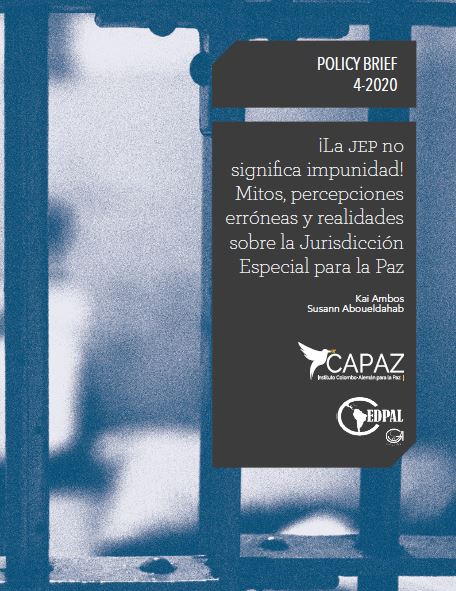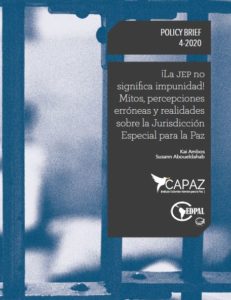
CAPAZ Policy Brief 4-2020: ¡The JEP does not stand for impunity! Myths, misperceptions and realities about the Special Peace Jurisdiction

Introduction (extract):
The JEP (Jurisdicción Especial para la Paz), a key legal mechanism in the Colombian transitional justice project, has become the subject of heated debate among its staunch defenders and its vehement opponents.* This Policy Brief addresses the main misunderstandings that exist in the discussion surrounding the JEP, especially those concerning its role and potential to eradicate the many decades of impunity in Colombia. It aims to provide a framework for a debate that, on the one hand, leads to an acknowledgement of the JEP’s progress and, on the other, shows its most pressing challenges and developments.
Authors/researchers:
Susann Aboueldahab. Has a law degree from Freie Universität Berlin, Germany. Researcher and doctoral candidate at the Centre for the Study of Latin American Criminal Law and Criminal Procedure (CEDPAL) at the University of Göttingen, Germany. Contact: susann.aboueldahab@jura.uni-goettingen.de
Kai Ambos. Professor of criminal law and criminal procedure, comparative law, international criminal law, and international law at the School of Law at the University of Göttingen, Germany. Director of the Centre for the Study of Latin American Criminal Law and Criminal Procedure (CEDPAL) at the same university. Judge at the Special Tribunal for Kosovo (Kosovo Specialist Chambers) in The Hague, the Netherlands. Amicus curiae of the JEP in Bogotá, Colombia. Contact: cedpal@uni-goettingen.de
This Policy Brief was supported and sponsored by CAPAZ and the Centre for the Study of Latin American Criminal Law and Criminal Procedure – CEDPAL.
Access the CAPAZ Policy Brief PB 4-2020 (.pdf, in Spanish)
Susann Aboueldahab, Kai Ambos. The JEP does not stand for impunity! Myths, misperceptions and realities about the Special Peace Jurisdiction. CAPAZ, PB4-2020: Bogotá, June 2020. 18 p. ISSN: 2711-0346
(NW Text: From PB4-2020. English version: Tiziana Laudato)



